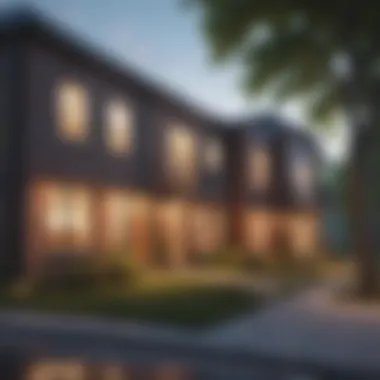Exploring Off-Campus Housing Options Near Regis University


Intro
Finding suitable off-campus housing is a significant decision for students and faculty at Regis University. The choices made can greatly influence the academic experience, social interactions, and overall well-being. Exploring various neighborhoods, housing types, and pricing can help individuals identify the best fit for their lifestyle and needs. This guide aims to provide a thorough overview of the off-campus housing options available around Regis University, examining various aspects of the housing landscape.
Featured Homes
Spotlight on Unique Architectural Designs
Among the housing selections near Regis University, there are diverse architectural styles that reflect local culture and history. From modern apartment complexes to charming Victorian houses, there is something for everyone.
- Modern Apartments - These often feature clean lines and contemporary finishes. They typically provide amenities like fitness centers and communal spaces, appealing to students seeking a vibrant lifestyle.
- Historic Homes - Houses dating back several decades or even centuries provide unique character. These homes may have intricate woodwork or vintage fixtures that give them a distinct flair, perfect for those who appreciate history and craftsmanship.
Exploring these homes showcases the blend of lifestyles available, which can appeal to different demographics within the university community.
Home Tours: Inside Stunning Interiors
Many off-campus residences offer homes with impressive interiors. During housing tours, potential renters can view details such as spacious layouts, updated appliances, and aesthetic designs. These features not only enhance living conditions but also contribute to a peaceful study environment.
Key interior aspects to consider:
- Open Floor Plans - These layouts encourage socialization among roommates while maximizing space efficiency.
- Natural Light - Homes with large windows or skylights create bright atmospheres conducive to studying or relaxation.
- Personalization Potential - Some homes allow residents to customize aspects, enabling a personal touch.
These elements significantly influence the desirability of living arrangements for students.
Incredible Locations
Hidden Gems: Underrated Travel Spots
The off-campus housing scene near Regis University is not just about homes; the neighborhoods themselves present unique features. Some hidden gems offer affordable and attractive living spaces with easy access to local parks, cafes, and cultural venues. These less-known areas often provide a quieter lifestyle with a strong sense of community, ideal for study and personal growth.
Top Destinations for Home and Culture Lovers
For those who cherish cultural experiences, living in proximity to arts districts or historical landmarks can elevate the college experience. Exploring areas such as the Highlands or Baker neighborhood exposes residents to a vibrant arts scene, diverse food options, and community events. Not only do these neighborhoods enhance academic engagement, but they also foster personal growth through cultural immersion.
Prelude to Off-Campus Housing
Off-campus housing presents a vital alternative for students and faculty at Regis University, enabling them to explore varied living environments. This section outlines why understanding off-campus options is crucial for individuals looking to balance their academic and personal lives effectively.
Individuals often find that off-campus living affords greater independence. The freedom to choose where they live can profoundly influence their college experience. Each housing type, from apartments to shared houses, comes with distinct benefits and challenges, which require thoughtful consideration. Being informed about the local housing landscape not only helps in making sensible choices but also invites opportunities for community engagement and networking.
As living arrangements can ultimately affect one’s academic performance, it becomes essential to evaluate each option based on personal lifestyle, budget, and study habits. By understanding the nuances of off-campus housing, students can cultivate a living situation that supports both their educational goals and social aspirations.
Understanding Off-Campus Living
Off-campus living can be defined as residential arrangements that exist outside the confines of university-managed housing. This involves a variety of accommodations such as private apartments, rented rooms, or houses shared with fellow students. Each option provides unique benefits that can accommodate the varying needs of the university community.
Many students are drawn to off-campus housing due to the potential for greater space and privacy. Often, these accommodations offer rooms larger than traditional dormitories, along with communal areas for relaxation and study.
Moreover, living off-campus encourages life skills development. Skills like budgeting, cooking, and cleaning become integral as individuals manage their own households. These experiences can foster personal growth and responsibility that is invaluable post-graduation.
Importantly, the atmosphere of off-campus living can differ significantly from campus life. Students may find quieter environments conducive to studying, or engage in local community events that enhance their social experience. Understanding the implications of off-campus life is vital for anyone looking to transition from on-campus residences.
Reasons for Choosing Off-Campus Housing


Choosing off-campus housing can resonate for various reasons, some of which hold more weight depending on personal priorities. Here are some key motivations:
- Financial Considerations: Off-campus living can often be more cost-effective, especially when splitting rent with roommates. This makes housing more affordable than traditional on-campus options.
- Lifestyle Preferences: Some individuals value independence and consider off-campus housing as an extension of their personal identity. Having control over living arrangements can lead to a more tailored lifestyle.
- Fewer Restrictions: On-campus housing may impose rules that students find constraining. Living off-campus allows more freedom regarding guests, parties, and even decorating spaces.
- Location Variety: The surrounding neighborhoods offer diverse settings. Some may prefer the vibrancy of city living, while others might opt for quieter suburbs.
Understanding these motivations can help students and faculty choose an off-campus housing arrangement that aligns with their academic pursuits and lifestyle preferences. Your choice should reflect not just a place to stay, but a setting that enriches your experience at Regis University.
Housing Options Available
Understanding the various housing options available near Regis University is essential for students and faculty who prefer to live off-campus. The choice of where to live impacts daily life significantly. Housing can influence social interactions, academic performance, and overall well-being. Therefore, evaluating these options carefully is necessary.
Types of Off-Campus Housing
Apartments
Apartments are among the most common choices for off-campus living. They provide a semi-independent lifestyle, with the freedom to personalize one’s living space. A key characteristic of apartments is the availability of various sizes and layouts. This allows individuals to select a place that fits their preferences and budgets.
The unique feature of these spaces is the amenities often included. Many come with laundry facilities, gyms, or communal areas that enhance convenience. However, these benefits could come at a cost, including higher rent and strict leasing rules.
Shared Houses
Shared houses offer an alternative that promotes social interaction. Renting a room in a shared house means living with other individuals. This setup usually leads to lower living costs, which can be a significant advantage for students. The key characteristic of shared houses is their community-like atmosphere, making it easier for students to form friendships.
Nonetheless, shared living can have its challenges. Conflicts can arise over cleanliness, noise, and shared responsibilities. Such dynamics can be beneficial for growing social skills but may also create stress if not managed well.
Studios
Studios provide a compact living option that blends the bedroom, living area, and kitchen into one space. This is ideal for individuals who seek simplicity and minimalism. The key feature of studios is their self-sufficiency, allowing one to handle their living arrangements without external dependencies.
An advantage of studios is that they often come with lower rent compared to larger apartments. However, the limited space can be constraining for some. Especially for students who have extensive belongings, a studio may feel cramped quickly.
Key Features to Consider
Choosing the right off-campus housing also involves evaluating key features that influence living quality.
Furnishings
Furnishings significantly impact comfort levels in a home. Many rental properties come furnished, providing essentials like a bed, table, and sofa, which can save money and time. The main advantage of furnished spaces is the immediate move-in readiness; no need to purchase large items.
However, sometimes this may mean compromising on style or comfort. The mix of furnishings may not suit personal preferences.
Utilities
Utilities represent an essential aspect of off-campus housing to consider. It includes electricity, water, heating, and sometimes internet. A critical element is understanding what utilities are included in the rent. This can reshape budgeting plans considerably.
For instance, if heat or water is not included, students may face unexpected costs. On the other hand, knowing upfront about included services offers peace of mind and better financial planning.
Proximity to Campus
Proximity to Regis University can greatly impact daily life. Living close to campus often means easier access to classes, libraries, and social events. A major characteristic is the convenience that reduces commute time, allowing more hours dedicated to studies or other activities.
However, renting close to campus can mean higher rates. Students need to weigh the cost against the benefits of proximity carefully. The long term savings in transportation costs should also be evaluated.
Exploring Nearby Neighborhoods
Understanding the neighborhoods around Regis University is a crucial part of the off-campus housing selection process. The area surrounding any university not only defines the living experience but also significantly influences a student's academic performance, social dynamics, and overall lifestyle. By exploring nearby neighborhoods, students can identify locations that fit their personal preferences and commuting needs.


In this segment, we will delve into three prominent neighborhoods: Highlands, Capitol Hill, and West Washington Park. Each area offers its own distinct characteristics that appeal to different segments of the student body. Evaluating the attributes of these neighborhoods enables students and faculty to make informed housing decisions.
Neighborhood Profiles
Highlands
Highlands is an attractive neighborhood known for its vibrant community atmosphere. One specific aspect that stands out is its blend of historic architecture and modern developments. This combination adds charm and character to the area, making it a desirable location for many students. Highlands is particularly favored for its variety of dining and entertainment options, which enhance the social life of residents.
A key characteristic of Highlands is its accessibility to outdoor spaces, including parks and recreation areas. The presence of the popular Highland Park allows for outdoor activities, which can be beneficial for students seeking balance amidst their academic commitments. However, while Highlands is lively, the relatively higher rental prices can be a disadvantage for some students on a tight budget.
Capitol Hill
Capitol Hill is another prominent neighborhood, renowned for its eclectic culture and vibrant nightlife. A specific aspect worth noting is its proximity to many cafes, bars, and cultural venues. This area attracts students looking for a lively environment. The key characteristic of Capitol Hill is its strong sense of community coupled with artistic influences, often seen in local art displays and performances.
Moreover, Capitol Hill offers a unique feature: its diverse housing options range from historic mansions to modern apartments, accommodating various lifestyle preferences and budgets. However, the downside is that this neighborhood can be crowded, leading to noise and parking difficulties, which might not suit everyone’s preference.
West Washington Park
West Washington Park is known for its residential feel combined with an easy-going lifestyle. It offers a more relaxed environment compared to the other neighborhoods, making it a desirable choice for students who prefer a quieter setting. The key characteristic of West Washington Park is its beautiful green spaces, including the notable Washington Park, that encourages outdoor activities and wellness.
The unique feature of West Washington Park is its family-friendly vibe, which can support a sense of stability for students juggling their studies and personal life. The neighborhood does have the downside of being less vibrant than others in terms of nightlife and social attraction, but it compensates with a close-knit community feel and affordable rental options.
Accessibility and Transportation
Accessibility and transportation play significant roles in the off-campus housing experience. Given the proximity of Regis University to public transport options, students benefit from easy commuting to classes and other parts of the city. Knowing the transit routes, like the light rail and bus services, helps students minimize commute times, enabling them to better manage their academic and personal time commitments.
In summary, understanding and exploring the nearby neighborhoods serves as a pivotal aspect of selecting off-campus housing. Each area has its advantages and disadvantages, and the decision ultimately depends on individual preferences and needs.
Cost Analysis
Cost analysis is an essential component of any housing strategy, particularly for students and faculty at Regis University. Understanding the financial landscape helps individuals make informed decisions regarding off-campus living. It encompasses not only the monthly rent but also additional expenses that could impact one’s budget.
By conducting a thorough cost analysis, potential off-campus residents can identify affordable options while also considering the overall financial implications of their living choices. Shifting focus to cost analysis can help align housing decisions with academic and personal priorities.
Average Rent Prices
Average rent prices vary widely based on location, amenities, and housing type. In neighborhoods surrounding Regis University, students can find a range of price points. Typically, one-bedroom apartments may range from $1,200 to $1,800. Shared houses can present a more economical solution, with room rentals costing around $600 to $900 depending on factors like location and house size.
It is important to comprehend the rental market trends to avoid overspending. Price fluctuations can occur based on the season and demand for housing. Some months may see lower prices due to fewer students searching for housing, while others may experience price surges as leases begin or change hands.
Additional Expenses
When budgeting for off-campus housing, individuals must also account for additional expenses.
Internet and Utilities
Internet and utilities are fundamental aspects of living independently, contributing significantly to the monthly budget. The average cost of internet services ranges from $50 to $80 per month, which can vary based on speed and provider. Utilities such as electricity, water, and gas may add another $150 to $250 monthly, depending on usage and the size of the living space.
Having reliable internet access is crucial for students, forming the backbone for studies and connectivity. However, costs can add up quickly, making it vital to incorporate these figures into your overall financial planning. Individuals must also be aware of potential fluctuations in utility prices throughout the year, particularly with seasons affecting heating or cooling costs.
Transportation Costs
Transportation costs play an important role in off-campus living. For many students, commuting to campus is a regular expense that can quickly accumulate. Public transportation offers a cost-effective option, usually costing around $100 to $150 for a monthly pass. Alternatively, owning a car introduces costs like insurance, fuel, and parking.


Parking near Regis University can be limited and pricier, often requiring purchasing a permit. Balancing the choice of public transport or personal vehicles is key. It's clamorous to factor in location relevancy when assessing transportation costs, as living further away could lead to higher overall expenses.
Understanding the full spectrum of housing expenses is crucial for students and faculty in shaping their off-campus experiences.
By being mindful of these elements, anyone considering off-campus housing can make more strategic choices that align financial resources with lifestyle priorities.
Impact on Academic Performance
Understanding the impact of off-campus housing on academic performance is essential for students at Regis University. Choosing where to live can greatly influence not only the quality of a student's education but also their overall well-being.
Living Environments and Conduct
The living environment plays a critical role in shaping a student's academic journey. A quiet, organized space can foster better focus, enhancing study habits and improving grades. Conversely, chaotic surroundings may contribute to increased distractions, leading to diminished academic performance.
Furthermore, the conduct of housemates or neighbors can affect a student's daily routine. For instance, living with peers who prioritize academics can create a supportive atmosphere. This can lead to shared study sessions and motivation to excel. On the other hand, if housemates engage in disruptive behaviors, such as frequent parties or late-night gatherings, it can negatively impact concentration and study time.
Social Dynamics in Off-Campus Housing
The social dynamics of off-campus living can significantly influence a student's experience and success. Forms of socialization can either uplift or hinder academic pursuits. For students who thrive on interaction, living off-campus can offer opportunities to connect with a diverse group of peers. This could lead to forming study groups or partnerships that enhance learning outcomes.
In contrast, students who find themselves isolated or lacking community engagement may face difficulties. This can lead to feelings of loneliness and affect mental health, which in turn, can weaken academic performance. Adjusting to off-campus life requires a balance between social activities and academic responsibilities.
Maintaining a Balanced Lifestyle
Maintaining a balanced lifestyle is crucial for students living off-campus. It encompasses various aspects of life, including academic responsibilities, personal interests, and social relationships. A well-rounded lifestyle contributes not only to academic success but also to emotional and physical well-being. Students often face multiple challenges when transitioning from campus life to off-campus living, such as time management and community integration. Thus, it is important to understand how to effectively balance these elements.
Work-Life Balance as a Student
Finding a balance between academic duties and personal life is vital for students. The responsibility of managing coursework, attending classes, and preparing for exams can easily become overwhelming. Therefore, creating a structured schedule can help in allocating time efficiently. Here are some key aspects to consider when trying to achieve a healthy work-life balance:
- Set Clear Boundaries: Establish defined study times and personal times. Letting friends know when you are unavailable for social engagements can help avoid interruptions.
- Utilize Time Blocks: Use a planner or a digital calendar. Break your day into focused time slots for study, leisure, and rest.
- Focus on Priorities: Identify your most important tasks for the week. Tackle high-priority assignments first.
Additionally, engage in regular physical activity. Exercise can relieve stress and enhance concentration. Finding a group or activity nearby, like joining a local gym or participating in community sports, can enable you to stay active while making new friends.
Establishing Community Connections
Building community connections is equally important for those living off-campus. Strong social ties not only enhance one’s living experience but also play a significant role in academic performance and mental health. Cultivating relationships helps create a support network that is necessary for thriving in a challenging academic environment.
To establish these connections:
- Participate in Local Events: Attend community events or student gatherings nearby. This provides opportunities to meet people and learn about the culture of the neighborhood.
- Join Student Organizations: Many groups exist with common interests. Participating helps not only in networking but also in developing new skills and interests.
- Volunteer: Engaging in local volunteer opportunities fosters community ties while providing personal fulfillment.
Active community engagement enriches the living experience and leads to lasting friendships.
Ultimately, maintaining a balanced lifestyle while living off-campus fosters a richer, more satisfying experience. Remember, the key to success in balancing academic demands and personal life is planning and participation in the community.
Closure
The topic of off-campus housing options near Regis University holds significant weight for current and prospective students. This article has elaborated on various key elements that contribute to informed decisions surrounding housing. Understanding the choices available can greatly affect a student's academic and personal life.
Recap of Findings
From exploring types of housing, such as apartments and shared houses, to analyzing costs and key features, we have covered a broad spectrum. Notable neighborhoods around Regis University, like the Highlands and Capitol Hill, offer distinct community vibes and accessibility to campus resources. The impact of living arrangements on academic performance has also been underscored, indicating that a conducive living environment is crucial.
Final Recommendations for Off-Campus Housing
When considering off-campus housing, several recommendations rise to the forefront:
- Evaluate your Budget: Make sure to assess your financial capabilities before committing to any housing options. Consider not only the rent but also utilities and transport expenses.
- Visit Potential Homes: Prior to making a decision, visiting various housing options helps you gain a better understanding of what each place offers. Look for factors like proximity to campus, safety, and overall ambiance.
- Connect with Other Students: Engaging with fellow students can provide valuable insights about living off-campus. They might share experiences that could influence your choice positively.
In summary, every student has unique needs and preferences. Engaging actively with the housing process leads to better decisions. Prioritize both the academic and lifestyle aspects to find a fitting off-campus home that complements your journey at Regis University.







